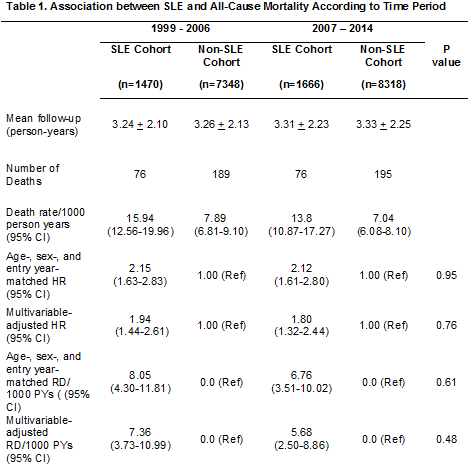Session Information
Date: Wednesday, November 16, 2016
Title: Systemic Lupus Erythematosus – Clinical Aspects and Treatment V: Damage and Morbidity
Session Type: ACR Concurrent Abstract Session
Session Time: 9:00AM-10:30AM
Background/Purpose: Systemic lupus erythematosus (SLE) is associated with an increased risk of mortality. Despite improvements in the recognition and treatment of SLE, it remains a challenging illness to treat, and patients with SLE also frequently suffer from multiple comorbidities, including premature cardiovascular disease and infections. Rheumatoid arthritis (RA) has also been shown to be associated with increased mortality, but studies have found substantially reduced mortality rates in recent years, likely due to improved treatment for RA.1 However, recent mortality trends in SLE are unknown. Our objective was to assess whether mortality rates in SLE patients have changed over time in a general population context.
Methods: We conducted a population-based cohort study using data from 1999-2014 in a medical record database representative of the UK general population. We identified incident cases of SLE and up to 10 controls matched on age, sex, and entry time. This cohort was divided into two subgroups based on year of SLE diagnosis, forming the early cohort (1999-2006) and late cohort (2007-2014). We compared mortality rates, hazard ratios (HRs) (using a Cox proportional hazard model), and rate differences (RDs) (using an additive hazard model) between SLE and non-SLE cohorts, adjusting for demographics, lifestyle factors, comorbidities, medications, and healthcare use.
Results: Both the early and late cohorts (N = 1,470 and 1,666) had a similar mean age (50 and 51 years, respectively) and sex proportion (18% and 17% male, respectively). In both cohorts, SLE patients had a higher risk of mortality compared to their corresponding comparison cohort (i.e., 15.9 vs. 7.9 deaths/1,000 person-years in the early cohort and 13.8 vs. 7.0 deaths/1000 person-years in the late cohort) (Table 1). The corresponding absolute mortality RDs were 8.1 (95% confidence interval (CI), 1.3-11.8) and 6.9 (95% CI, 3.5-10.0) deaths/1,000 person-years, and the mortality HRs were 2.51 (95% CI, 1.63-2.83) and 2.12 (95% CI, 1.61-2.80) in the early and late cohorts, respectively (both P values for interaction > 0.6). After adjusting for covariates, the HRs and RDs remained similar between the early and late cohorts (both P values for interaction >0.47), suggesting similar levels of excess mortality in SLE patients in the two cohorts.
Conclusion: This UK population-based cohort study suggests that the excess mortality among SLE patients has not improved over a recent 16-year period. This is in contrast to recent findings that RA patients have had substantially improved survival during the same study period.1 This supports the need for improved treatment options and strategies for SLE as well as its associated comorbidities. References: 1. Zhang Y et al. Improved Survival in Rheumatoid Arthritis: A General Population Based Cohort Study. Ann Rheum Dis. doi: 10.1136/annrheumdis-2016-205269 (Epub ahead of print). 
To cite this abstract in AMA style:
Jorge A, Lu N, Rai SK, Choi H. Mortality Trends in Systemic Lupus Erythematosus: A General Population-Based Cohort Study [abstract]. Arthritis Rheumatol. 2016; 68 (suppl 10). https://acrabstracts.org/abstract/mortality-trends-in-systemic-lupus-erythematosus-a-general-population-based-cohort-study/. Accessed .« Back to 2016 ACR/ARHP Annual Meeting
ACR Meeting Abstracts - https://acrabstracts.org/abstract/mortality-trends-in-systemic-lupus-erythematosus-a-general-population-based-cohort-study/
